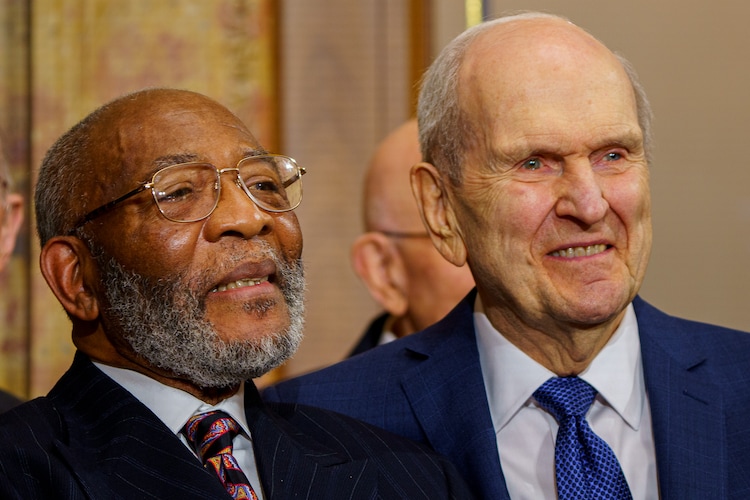Most people wouldn’t naturally think of President Russell M. Nelson, leader of The Church of Jesus Christ of Latter-day Saints, and Vice President Kamala Harris as engaged in the same work. But the Rev. Amos C. Brown is not most people.
The San Francisco-based Baptist pastor has known Harris, the likely replacement for President Joe Biden as the 2024 Democratic presidential nominee, for nearly 30 years.
According to CNN, the longtime civil rights activist was one of Harris’ first calls after she learned the embattled Biden was backing out of the race and endorsing her as his heir apparent.
At the same time, Brown, who serves as the president of the San Francisco branch of the NAACP, has worked closely in recent years with Nelson on issues related to racial and social justice.

(Trent Nelson | The Salt Lake Tribune) Amos C. Brown and church President Russell M. Nelson during the 2021 announcement of new joint initiatives with the NAACP in Salt Lake City.
The way Brown sees it, both Nelson and Harris are “followers of Jesus of Nazareth,” who, he told The Salt Lake Tribune on Monday, in their own ways and spheres of influence, are helping to improve life for the downtrodden. In doing so, he said, they are busy enacting the “beloved society” described by one of his personal mentors, Martin Luther King Jr.
In the case of Harris, Brown cited as evidence her long history as a “productive public servant” — from her relatively humble beginnings as San Francisco district attorney to the second highest office in the land.
“She uses her authority not to lord over people,” he said, “but to work with people to achieve meaningful social justice.”
Likewise, Brown said, Nelson has been “visionary” in his role as president of a global church — someone who “took the initiative as a prophet” to “march ahead of the crowd” by pairing calls for civility and collaboration with “substantive action.”
In doing so, he suggested both have kept “their eyes on Jesus” and helped to fulfill his mission to give not just life, but also life “more abundantly.”
Brown specifically applauded the 2021 announcement that the church, under Nelson’s leadership, would provide millions in education and humanitarian aid aimed at supporting marginalized Americans, particularly in Black communities.
More recently, the faith has helped the Third Baptist Church of San Francisco, where Brown has served as pastor since 1976, launch “self-reliance” financial literacy courses and a community garden located in the city’s southeast corner.
(Trent Nelson | The Salt Lake Tribune) Amos C. Brown during the 2021 announcement of new joint initiatives with the NAACP in Salt Lake City.
“We have been part of a continuing relationship,” he said of Nelson, “that is outstanding.”
It’s an unlikely friendship, both he and Nelson acknowledged in a statement they co-signed, along with two other heads of the NAACP, in 2020 after the murder of George Floyd.
But perhaps unnecessarily so.
“Our common bond as followers of Jesus Christ and as religious leaders gave us a natural foundation from which to build a friendship,” they wrote, “as well as an opportunity to better appreciate each other’s unique perspective and experience.”
It’s just one reason why, this September, when soon-to-be-centenarian Nelson blows out the candles on his landmark birthday cake, Brown plans to be there.









